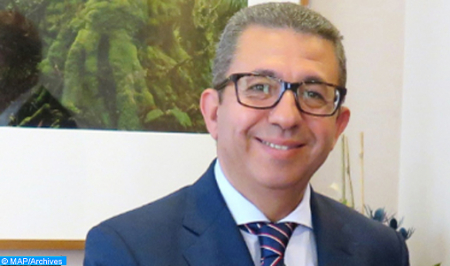Diplomatic Vitality Allowed Morocco to Achieve Resounding Successes, Ambassador Says
The diplomatic vitality of the Kingdom, driven by His Majesty King Mohammed VI, has enabled it to achieve resounding successes and consolidated its place in the concert of nations, said the Moroccan ambassador to Sweden and Latvia, Karim Medrek. “As constructive and bearer of values and ideals consistent with the UN Charter as marked by the seal of solidarity, cooperation and dialogue, Moroccan diplomacy adapts to a changing world and adopts a multilateral approach to defend the supreme interests of the country on regional, African and international issues,” wrote Medrek in an op-ed published by Scandinavia Times, on the occasion of the celebration of the Throne Day. Morocco “has managed to rebalance its relations diplomatically, to reposition itself vis-à-vis its traditional partners and to open up to new countries, as part of the diversification of its strategic partnerships. In terms of foreign policy, the fundamentals have not changed, inspired by the principles of the United Nations Charter and the strategic axes of Morocco’s integration into the international community, namely Peace, Stability and Cooperation, the diplomat continued. “Based on its doctrine, the Kingdom has multiplied and diversified its cooperation partnerships and developed a credible and transparent diplomacy, acting in favor of its region and its continent,” he said, noting that Morocco has demonstrated its commitment to contribute to the consolidation of peace and security as well as to be an active and decisive actor in the face of environmental challenges. He added that “Morocco remains convinced that only tolerance, coexistence and cohabitation are even capable of making peace. The living together of Christians, Muslims and Jews has allowed Morocco to preserve its multicultural origins. It is time to break down the wall of mistrust and misunderstanding that divides cultural spaces to try to build, from our achievements, a universal discourse. Regarding the Moroccan Sahara issue, the ambassador stressed that Morocco has continued “its efforts to make its voice heard regarding its territorial integrity, in full compliance with the norms of the United Nations.” In this context, he explained that “the political solution proposed by the Kingdom, namely an autonomy plan within the framework of its sovereignty, has been strongly supported by the international community, which called it pragramtic, credible, fair and comprehensive,” adding that the Moroccan proposal has equally been supported by the majority and African countries, 21 of which have opened consulates in the cities of Laayoune and Dakhla.” In addition to this are the realistic and fair positions adopted by Germany, Spain, the United States of America, France, as well as several Arab and Asian countries, he noted. “The Saharan provinces of Morocco are today the scene of an unprecedented economic, political, social and cultural development. On the diplomatic scene, about fifty countries that once supported separatist theses have joined the right side of history, withdrawing their recognition to the ghostly entity,” he added. The diplomat recalled that His Majesty the King has initiated, since His enthronement in the late 90s, bold and ambitious reforms and launched major structuring projects, the ultimate goal being to firmly and vigorously consolidate the democratization process of the Kingdom in the continuity of the true path of formidable political reforms traced by the late HM Hassan II, and aimed at the development and prosperity of the country. The reign of HM King Mohammed VI is an uninterrupted continuity of actions that can not be summed up in a figure as symbolic as the 23 years of reign of the Sovereign, he stressed, noting that the Kingdom, faithful to its irreversible choice, resolutely pursues the process of strengthening the institutions of a modern state, based on the principles of participation, pluralism and good governance. Medrek reviewed, to this end, the profound reforms launched and implemented by the Kingdom on the institutional and political levels, human development, public policies, the place of women, the economy, infrastructure, climate protection and environment. In terms of migration, the diplomat said that Morocco, due to its strategic geographical location as a junction point between Europe and Africa, has developed a real migration policy based on the principles of realism and humanism. “This policy, which has allowed more than 60,000 nationals of sub-Saharan African countries to regularize and thus improve their living conditions in Morocco, reflects the strong attachment of Morocco to its membership in its continent and its concern for its development and prosperity,” he explained.

